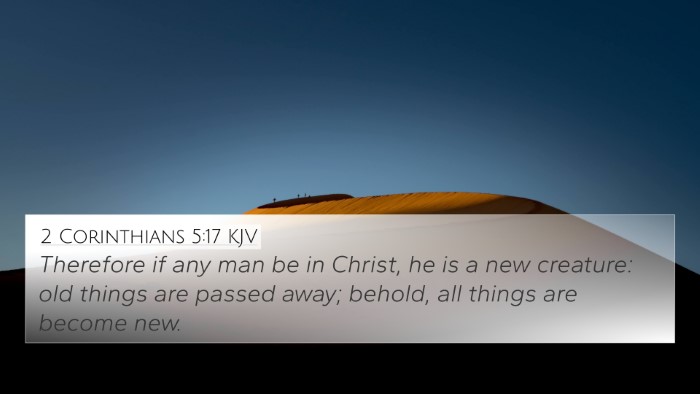Old Testament
Genesis Exodus Leviticus Numbers Deuteronomy Joshua Judges Ruth 1 Samuel 2 Samuel 1 Kings 2 Kings 1 Chronicles 2 Chronicles Ezra Nehemiah Esther Job Psalms Proverbs Ecclesiastes Song of Solomon Isaiah Jeremiah Lamentations Ezekiel Daniel Hosea Joel Amos Obadiah Jonah Micah Nahum Habakkuk Zephaniah Haggai Zechariah MalachiJames 2:18 Similar Verses
James 2:18 Cross References
Yea, a man may say, Thou hast faith, and I have works: shew me thy faith without thy works, and I will shew thee my faith by my works.
Uncover the Rich Themes and Topics of This Bible Verse
Listed below are the Bible themes associated with James 2:18. We invite you to explore each theme to gain deeper insights into the Scriptures.
James 2:18 Cross Reference Verses
This section features a detailed cross-reference designed to enrich your understanding of the Scriptures. Below, you will find carefully selected verses that echo the themes and teachings related to James 2:18 KJV. Click on any image to explore detailed analyses of related Bible verses and uncover deeper theological insights.

1 Timothy 1:5 (KJV) »
Now the end of the commandment is charity out of a pure heart, and of a good conscience, and of faith unfeigned:

James 3:13 (KJV) »
Who is a wise man and endued with knowledge among you? let him shew out of a good conversation his works with meekness of wisdom.

Galatians 5:6 (KJV) »
For in Jesus Christ neither circumcision availeth any thing, nor uncircumcision; but faith which worketh by love.

James 2:14 (KJV) »
What doth it profit, my brethren, though a man say he hath faith, and have not works? can faith save him?

Romans 14:23 (KJV) »
And he that doubteth is damned if he eat, because he eateth not of faith: for whatsoever is not of faith is sin.

Hebrews 11:31 (KJV) »
By faith the harlot Rahab perished not with them that believed not, when she had received the spies with peace.

Hebrews 11:33 (KJV) »
Who through faith subdued kingdoms, wrought righteousness, obtained promises, stopped the mouths of lions.

Titus 2:7 (KJV) »
In all things shewing thyself a pattern of good works: in doctrine shewing uncorruptness, gravity, sincerity,

Matthew 7:16 (KJV) »
Ye shall know them by their fruits. Do men gather grapes of thorns, or figs of thistles?

Romans 3:28 (KJV) »
Therefore we conclude that a man is justified by faith without the deeds of the law.

2 Corinthians 7:1 (KJV) »
Having therefore these promises, dearly beloved, let us cleanse ourselves from all filthiness of the flesh and spirit, perfecting holiness in the fear of God.

1 Corinthians 13:2 (KJV) »
And though I have the gift of prophecy, and understand all mysteries, and all knowledge; and though I have all faith, so that I could remove mountains, and have not charity, I am nothing.

Hebrews 11:6 (KJV) »
But without faith it is impossible to please him: for he that cometh to God must believe that he is, and that he is a rewarder of them that diligently seek him.

Romans 8:1 (KJV) »
There is therefore now no condemnation to them which are in Christ Jesus, who walk not after the flesh, but after the Spirit.

James 2:22 (KJV) »
Seest thou how faith wrought with his works, and by works was faith made perfect?

1 Thessalonians 1:3 (KJV) »
Remembering without ceasing your work of faith, and labour of love, and patience of hope in our Lord Jesus Christ, in the sight of God and our Father;

2 Corinthians 5:17 (KJV) »
Therefore if any man be in Christ, he is a new creature: old things are passed away; behold, all things are become new.

Romans 4:6 (KJV) »
Even as David also describeth the blessedness of the man, unto whom God imputeth righteousness without works,
James 2:18 Verse Analysis and Similar Verses
Understanding James 2:18
Verse: "But someone will say, 'You have faith, and I have works.' Show me your faith without your works, and I will show you my faith by my works." (James 2:18, ESV)
Verse Meaning and Interpretation
The verse in James 2:18 presents a profound discussion regarding the relationship between faith and works. The apostle James emphasizes that genuine faith is not merely an intellectual assent but is accompanied by actions that reflect that faith. Public domain commentaries provide insights into this transition from belief to practice, suggesting that faith and works are inseparable.
Insights from Commentators
- Matthew Henry: He explains that true faith produces good works and asserts that faith without works is dead. Henry emphasizes that mere verbal claims of belief are insufficient; the reality of one's faith must manifest through actions.
- Albert Barnes: Barnes remarks that James's argument addresses some who may have claimed belief without corresponding actions. He asserts that genuine faith will naturally result in good works, serving as evidence of the believer’s faith. He underscores the idea that one's actions are a visible demonstration of their faith.
- Adam Clarke: Clarke emphasizes the importance of works as crucial evidence of faith. He notes that while faith is essential for salvation, it should not exist in isolation. Clarke connects this verse to the overarching biblical theme that faith must be active and lived out.
Connections to Other Bible Verses
This verse is enriched through its connections with other Bible verses, creating a thematic thread throughout Scripture regarding faith and works. Here are some significant cross-references:
- Galatians 5:6: “For in Christ Jesus neither circumcision nor uncircumcision counts for anything, but only faith working through love.”
- Ephesians 2:8-10: “For by grace you have been saved through faith... For we are His workmanship, created in Christ Jesus for good works.”
- Romans 10:9-10: “If you confess with your mouth that Jesus is Lord and believe in your heart that God raised him from the dead, you will be saved... for with the heart one believes and is justified, and with the mouth one confesses and is saved.”
- 1 John 2:4: “Whoever says 'I know him' but does not keep his commandments is a liar, and the truth is not in him.”
- Titus 3:8: “The saying is trustworthy, and I want you to insist on these things, so that those who have believed in God may be careful to devote themselves to good works.”
- Matthew 7:16: “You will recognize them by their fruits. Are grapes gathered from thornbushes, or figs from thistles?”
- Philippians 2:12-13: “...work out your own salvation with fear and trembling, for it is God who works in you...”
Thematic Bible Verse Connections
James 2:18 themes tie closely to the following elements:
- Faith and Action: This verse articulates the dynamic interplay between belief and behavior. The expectation is that a believer's faith will produce an outward manifestation through good works.
- Evidence of Faith: The notion that true faith is evidenced through works is pivotal for understanding Christian doctrine as emphasized across both the Old and New Testament.
- Christian Responsibility: There is a relational responsibility to demonstrate one's faith actively. This aligns with various teachings throughout the Gospels and Epistles where believers are called to live out their faith.
Cross-Referencing Bible Study Methods
Utilizing tools for Bible cross-referencing enhances the understanding of thematic connections across the scriptures. Whether through a Bible concordance, a Bible cross-reference guide, or various Bible reference resources, these tools help readers engage with the Bible on a deeper level.
How to Use Bible Cross-References
To find cross-references in the Bible effectively:
- Utilize a Bible concordance to locate themes and specific words.
- Consult a cross-reference Bible study tool to see related verses.
- Engage in a comparative study to explore the context and deeper meanings of connected verses.
Conclusion
James 2:18 serves as a pivotal passage in understanding the relationship between faith and works in the life of a believer. Integrating insights from key public domain commentaries reveals the depth of scripture, the necessity of works as an expression of faith, and the love that should motivate such actions. The interconnectedness between Bible verses serves not only as a theological foundation but also as encouragement for believers to embody their faith in tangible ways.



